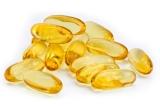 By now you’ve probably heard something about the wonders of omega-3 fat for improving mood. From helping overcome depression and ADHD, to treating Alzheimer’s disease and schizophrenia, some might call omega-3 fat a miracle cure for the mind.
By now you’ve probably heard something about the wonders of omega-3 fat for improving mood. From helping overcome depression and ADHD, to treating Alzheimer’s disease and schizophrenia, some might call omega-3 fat a miracle cure for the mind.
How can omega-3 help give us extra happiness? How much do we need to be happy, and how do we get it?
What is omega-3 fat?
What types of omega-3 fat are there?
What are trans fats and saturated fats?
What are good sources of omega-3 fat?
How much omega-3 fat do we need?
What type of omega-3 fish oil supplement should we take?
Can omega-3 fish oil interact with medication?
What is omega-3 fat?
Omega-3 fat is a type of polyunsaturated fat. It’s often called a good fat as it’s healthy. We need to get it from food as, unlike some fats, our bodies can’t make it.
What types of omega-3 fat are there?
The main types of omega-3 fats are ALA, DHA and EPA. DHA and EPA are particularly important for extra happiness. Our bodies convert ALA to DHA and EPA, but this conversion is not very effective. For this reason it’s best to consume more DHA and EPA rather than ALA. You’ll notice a reference to these fats on the nutrition information on the packets of fish oil supplements.
Did you know that about 60% of our brain is fat, of which a fair amount is DHA? As such, getting enough DHA is vital for our brains to function well – to concentrate, have a good memory, feel happy and less stressed. Lack of DHA can contribute to ADHD, depression and other mood and behavioral disorders.
What are trans fats and saturated fats?
Trans fat and saturated fat, on the other hand, are often called bad fats. Eating too much of these is bad for our brain, mood and health.
Trans fat is found mainly in partially hydrogenated vegetable oils. These oils are widely used by the food industry in many foods, such as cakes and cookies.
Saturated fat is high in:
- chocolate
- some margarines
- many cheap cooking oils
- the fat in meat and dairy products, including butter, cheese and cream
To feel happy, avoid eating a lot of bad fats.
What are good sources of omega-3 fat?
Good sources of omega-3 are:
- oily fish, such as salmon, herring, mackerel, tuna and sardines
- fish oil capsules and liquid
- krill oil (krill are small animals similar to prawns and shrimps)
- linseeds (flaxseeds)
- chia seeds
- pumpkin seeds
- walnuts
Choose grilled instead of fried fish. If you eat fried fish, especially when eating out, the oil used in frying could be high in bad fat. Re-heating oil can destroy any goodness that the oil may have anyway, as can heating the oil up very hot.
Beware of thinking you’re getting enough omega-3 from tinned fish. A number of them have had a lot of the omega-3 fat removed during processing. Check the nutrition information on the tin for an indication of how much omega-3 the fish contains.
How much omega-3 fat do we need?
Many health professionals recommend eating oily fish a few times a week for good health. Studies have shown that taking a fish oil supplement high in omega-3 can help prevent and treat mood disorders.
Dr. Barry Sears, in his book The Omega Rx Zone, recommends the following doses of pharmaceutical grade fish oil:
- Maintenance: 2.5 grams a day (1 teaspoon or 4 capsules)
- Improved brain function, which can lead to extra happiness: 5 to 10 grams a day (2 to 4 teaspoons or 8 to 16 capsules)

What type of omega-3 fish oil supplement should we take?
Pharmaceutical grade fish oils contain very low levels of contaminants, such as PCBs, dioxins and mercury. Fish oils from the supermarket or health food store, however, can often contain much higher levels of contaminants, which can cause health problems. Dr. Sears recommends taking only pharmaceutical grade fish oils. If, however, you take health food grade oils, ensure that you take no more than 4 capsules a day, and they have been tested for heavy metals.
Can omega-3 fish oil interact with medication?
Fish oils can interact with some medication. If you take medication and you’re unsure whether it will interact, ask a health professional or do your own research on the topic.
So for extra happiness, ensure that you get enough omega-3 fat. Limit your intake of trans and saturated fats, as too much of these are bad for your health and your mood.
written by Nyomi Graef
References:
Black, A, 2006, Brain health dramatically improved by intake of omega-3 fatty acids and fish oils, NaturalNews.com,
http://www.naturalnews.com/016353_omega-3_fatty_acids_mental_health.html
Carper, J, 2000, Your Miracle Brain, New York, USA: HarperCollins
Holford, P, 2003, Optimum Nutrition for the Mind, London, UK: Piatkus
Rosenfeld, I, 1995, Doctor, What Should I Eat?, New York, USA: Random House
Scientists Learn How Food Affects the Brain: Omega 3 Especially Important, 2008, ScienceDaily,
http://www.sciencedaily.com/releases/2008/07/080709161922.htm
Sears, B, 2002, The Omega Rx Zone, New York, USA: HarperTorch/ReganBooks
Simopoulos, AP et al., 1999, The Omega Diet, New York, USA: Harper Paperbacks
Stoll, AL, 2002, The Omega-3 Connection, New York, USA: Free Press

 April 5th, 2009
April 5th, 2009  Nyomi Graef
Nyomi Graef  Posted in
Posted in  Tags:
Tags: 

It is vital that people understand the importance of Omega3 and how diet can influence one’s health and happiness. You are full of good advice and sound health practices.
Keep those ideas flowing and may we all spread the good news.
Regards
Hilda
Great info, thanks.
you maybe interested in a book..
Healing without Freud or Prozac by David Servan
Thanks Lee-Anne, I’m glad you liked it. I’ll have a look at the book.
Cheers,
Nyomi
Thanks Hilda. I appreciate your support and feedback.
Best wishes,
Nyomi
Great article Nyomi. Good to mention that people can overdose on omega 3. I started popping Omega 3 capsules like tic tacs and woke up one morning with a rash and blotches the same colour as a nicely grilled red salmon actually. Anyway, great article, keep up the good work. Your site is an inspiration, cheers
I found a web site is Thailand that sells those fish oil capsules that take care of the fatty acids. I am not sure that they are safe to eat but I am tempted by the price. Any suggestion how to have better control over the quality of my diet supplements?
Would you please translate your blog into German as I’m not that comfortable reading it in English? I’m getting tired of using Google Translate all the time, there is a handy WP plugin called like global translator which will translate all your pages by default- that will make reading posts on your sweet blog even more comfortable. Cheers dude, Mariano Tadeo!
You know, I gotta tell you, I genuinely relish this site and the informative insight. I find it to be energizing and quite informative. I wish there were more blogs like it. Anyhow, I felt it was about time I posted a comment on Fight depression and improve mood with omega-3 fat | Extra Happiness – I just wanna say that you did a good job on this. Cheers mate!
Hi,
I’ve been doing a lot of research online lately regarding traffic and SEO since I just opened up an Thailand online shop with a couple of buddies.
The content of your website is brilliant and I’d really love to exchange links with you. Have a look at our website if you want, we put a lot of work and effort into it and are dedicated to improve it constantly.
I can’t offer any high Google Pagerank right now as we just opened but nevertheless we receive a lot of hits already (contact me for visitor stats) and I think both our sites can benefit from one another.
Anyway, just thought I’d share this with you – keep up the good work buddy and contact me if interested!
We all know that fish oil is good for brain development, function and heart health. Dr sears fish oil is one such product available to help you on your way. Do you prefer flax seed oil or fish oil? I think I prefer flax, it gives me less gas.
Hi,
I agree with you that trans fats are bad and Omega-3 fats are necessary for good health (up to a point), but I disagree when you say that saturated fats are bad for you.
Here is a good place to start to find out why saturated fat is in fact good for us:
http://high-fat-nutrition.blogspot.com/2010/01/saturated-fat-meta-analysis-krauss.html
Parting thought: our own body fat contains quite a bit of saturated fatty acids (like stearic acid) – why would they be bad for you?